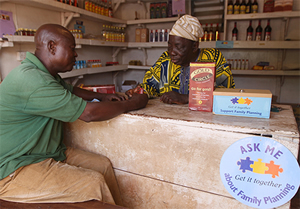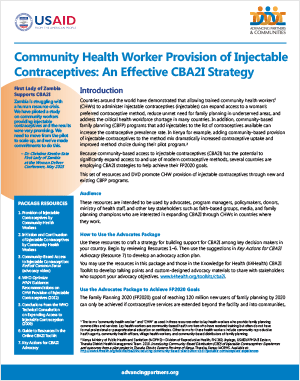
Countries around the world have demonstrated that allowing trained community health workers (CHWs) to administer injectable contraceptives (injectables) can expand access to a woman's preferred contraceptive method, reduce unmet need for family planning in underserved areas, and address the critical health workforce shortage in many countries. In addition, community-based family planning (CBFP) programs that add injectables to the list of contraceptives available can increase the contraceptive prevalence rate.
These resources are intended to be used by advocates, program managers, policymakers, donors, ministry of health staff, and other key stakeholders to craft a strategy for building support for CBA2I among key decision makers in country. Because community-based access to injectable contraceptives (CBA2I) has the potential to significantly expand access to and use of modern contraceptive methods, several countries are employing CBA2I strategies to help achieve their FP2020 goals. This set of resources and DVD promote CHW provision of injectable contraceptives through new and existing CBFP programs.
How to Use
Begin by reviewing Resources 1–6, then use the suggestions in Resource 7, "Key Actions for CBA2I Advocacy," to develop an advocacy action plan. You may use the resources in this package and those in the Knowledge for Health (K4Health) CBA2I Toolkit to develop talking points and custom-designed advocacy materials to share with stakeholders who support your advocacy objectives.

![]() Download the entire package (PDF, 3.1 MB)
Download the entire package (PDF, 3.1 MB)
![]() Version française (PDF, 6.1 MB)
Version française (PDF, 6.1 MB)
Introduction to the Package
This introductory brief explains the set of resources and DVD in the package. It promotes CHW provision of injectable contraceptives through new and existing CBFP programs.
 Introduction (PDF, 766 KB)
Introduction (PDF, 766 KB) Version française (PDF, 777 KB)
Version française (PDF, 777 KB)
1. Provision of Injectable Contraceptives by Community Health Workers
This brief summarizes the global status of provision of injectable contraceptives by trained CHWs and provides evidence and program examples that demonstrate the feasibility and benefits of this service delivery model.
 Resource 1 (PDF, 1 MB)
Resource 1 (PDF, 1 MB) Version française (PDF, 770 KB)
Version française (PDF, 770 KB)
2. Initiation and Continuation of Injectable Contraceptives by Community Health Workers
This brief summarizes the evidence on CHW provision of injectable contraceptives in sub-Saharan Africa that validates the feasibility and safety of CHW initiation and continuation of injectable contraceptives.
 Resource 2 (PDF, 684 KB)
Resource 2 (PDF, 684 KB) Version française (PDF, 684 KB)
Version française (PDF, 684 KB)
3. Community-Based Access to Injectable Contraception: Radical Common Sense
This brief describes a short advocacy video that can be used to promote CBA2I through CBFP.
 Resource 3 (PDF, 703 KB)
Resource 3 (PDF, 703 KB) Version française (PDF, 3.8 MB)
Version française (PDF, 3.8 MB)
4. WHO Optimize MNH Guidance: Recommendations on CHW Provision of Injectable Contraceptives (2012)
This brief describes the latest World Health Organization (WHO) task-sharing recommendations related to initiation and reinjection of injectable contraceptives by CHWs and confims the high-level support for CHW provision of injectables.
 Resource 4 (PDF, 463 KB)
Resource 4 (PDF, 463 KB) Version française (PDF, 409 KB)
Version française (PDF, 409 KB)
5. Conclusions from the WHO Technical Consultation on Expanding Access to Injectable Contraception (2009)
This brief summarizes the World Health Organization's (WHO) conclusions on provision of injectable contraceptives by CHWs, providing policy and programmatic guidance for decision makers.
 Resource 5 (PDF, 384 KB)
Resource 5 (PDF, 384 KB) Version française (PDF, 384 KB)
Version française (PDF, 384 KB)
6. Guide to Resources in the Online CBA2I Toolkit
This brief describes the CBA2I Toolkit and selected resources that are especially helpful for advocates.
 Resource 6 (PDF, 461 KB)
Resource 6 (PDF, 461 KB) Version française (PDF, 435 KB)
Version française (PDF, 435 KB)
7. Key Actions for CBA2I Advocacy
This brief outlines key activities for promoting CBA2I to inform an advocacy action plan.
 Resource 7 (PDF, 785 KB)
Resource 7 (PDF, 785 KB) Version française (PDF, 781 KB)
Version française (PDF, 781 KB)
